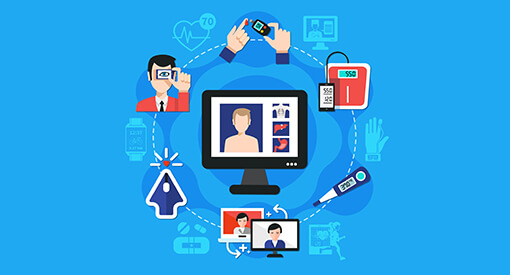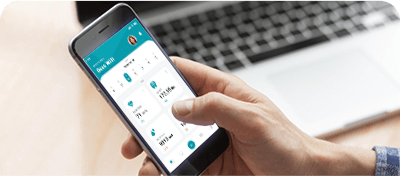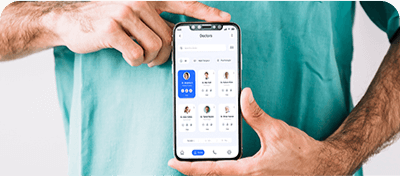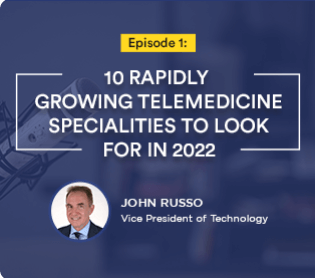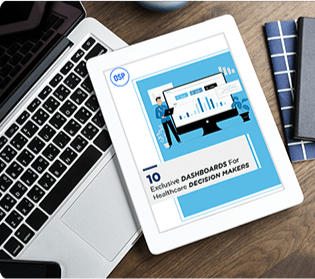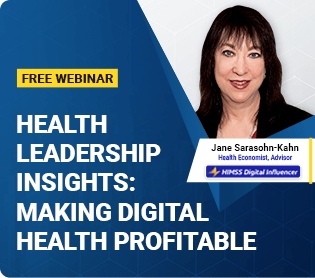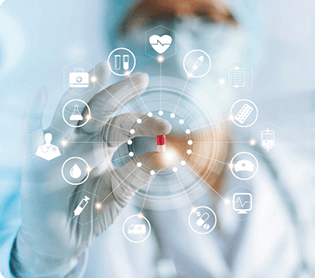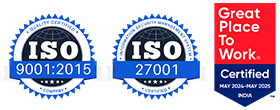Introduction to IoT Applications:
An IoT platform for healthcare comes with great potential but also certain challenges. With a rapid rise in IoT technology for healthcare, subsequent revenue generation is poised to double in the next couple of years. Therefore, every healthcare software development company is gearing up to offer cutting-edge IoT services to match the forthcoming demand. The journey toward building IoT healthcare software solutions is not a clear-cut path. A keen awareness of the best practices will work as a handy roadmap toward successful healthcare software application development.
10 Best IoT Healthcare Software Development Concepts
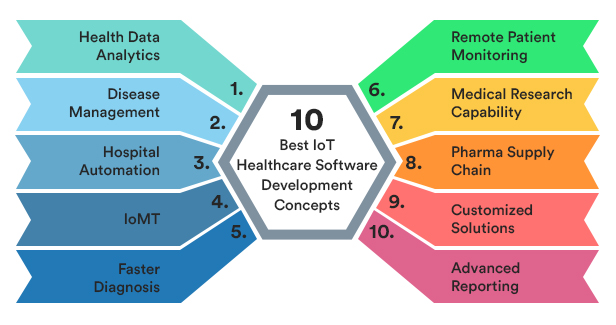
1. Health Data Analytics:
Patient health data is a critical factor that can significantly improve overall health and caregiving processes. Electronic Health Records (EHR) transform tedious paper-based approaches to enhance clinical productivity, improve accuracy, and protect reimbursement. EHR can then be applied toward electronic data exchange for secure and efficient data exchanges towards quality clinical practices. Finally, IoT technology for healthcare can build apps that collect and process this data toward insights and analysis for better health outcomes through clinical data analytics. IoT applications, such as these, assist healthcare organizations in making conscious decisions through healthcare analytics solutions. Medical records management is another solution that lends itself towards health data analytics. It is important, however, to remain continually mindful of HIPAA compliance while managing health data.
2. Disease Management:
IoT system management holds great potential for disease management. Healthcare mobile app development now offers advanced mHealth solutions to monitor patient health regularly and manage their disease remotely. Through data collection from wearables and other devices, vital health parameters can be tracked in real-time. Population health management can identify trends and improve the overall clinical outcomes through demographic data accumulation. Internet of Things devices can be applied as a substantial tool towards producing evidence for emerging health problems. Finally, healthcare interoperability can be deployed on IoT device management platforms to enable e-prescriptions and manage chronic diseases.
3. Hospital Automation:
Interned of Things applications serve well to enhance the efficiency of practice management and overall productivity through healthcare automation. Hospital automation is undertaken through integrated healthcare systems that assist the healthcare organization in managing the workforce and enhancing the caregiving process for higher revenues. Through a series of IoT healthcare software tools, hospital workflows are simplified, and cross-networking is strengthened. These automation tools extend comprehensively across various departments, within the hospitals, from labs, accounts, clinics, etc. Inventory management, through RFID tags and BLE beacons, is another distinct advantage of IoT healthcare applications.
4. IoMT:
The Internet of Medical Things (IoMT) is a comprehensive term for all devices and applications that connect healthcare information technology systems in custom medical software development. Through this Internet of Things technology, network management is harnessed to secure and easy medical data transfer. The current IoMT market worth stands at $73B and is expected to rise rapidly in the coming year. All smart devices, wearables, and medical monitors are deployed for healthcare use on personal and community levels within this domain. Real-time analysis through telehealth services is another distinct advantage of this Internet of Things technology. IoMT holds the potential to connect patients and providers in the most remote regions through advanced technologies and healthcare application development.
5. Faster Diagnosis:
If healthcare costs had to be attributed to one driving force, it would be the diagnosis. Healthcare professionals’ cost and time involvement result in slower diagnosis through the traditional way; as a healthcare software development company, medical software development of IoT devices should target quick and accurate data collection from remote locations for speedier diagnosis. Healthcare software development services can use IoT health data management toward this end of data collection through patient engagement systems. This reduces the professional time involved in gathering vital health information, as the data is transmitted in real-time through an IoT health monitoring system. Cloud computing in healthcare can then be applied to collate this data for faster diagnosis.
6. Remote Patient Monitoring:
A significant advantage of an IoT health monitoring system is applying custom healthcare solutions towards continual patient monitoring in even the most remote or far-off places. Remote access to patients, doctors, and other healthcare professionals through IoT health monitoring can offer a plethora of convenience for all entities in the healthcare system. IoT healthcare software development can deploy this technology toward providing better quality care-giving, higher patient convenience, and reduced stress for medical professionals. Healthcare provider solutions then use remote patient monitoring to reduce readmission rates and, thereby, the costs involved with fever hospitalizations. Finally, emergency cases can receive prompt attention through healthcare custom software development that sends out an automated alert for help.
7. Medical Research Capability:
As a research tool, IoT-based health management systems are undeniably helpful tools. With the Internet of Things in healthcare, large amounts of data are continually collected and analyzed. Real-time data collection can then be used through AI technologies to identify similarities and disparities through IoT healthcare software development services. Clinical informatics solutions can now swiftly undertake a job that earlier took decades to study. Healthcare IoT app development can implement predictive diagnosis capabilities through this data analysis and lower pressure on medical professionals. Cures for diseases, vaccinations, and alternate treatments can all be sped up through the ability of IoT healthcare solutions.
8. Pharma Supply Chain:
Persistent monitoring, predictive maintenance, and remote automation are healthcare IoT software solutions that can significantly reduce the woes of the pharma supply chain. Sensors can be deployed for drug production and storage transparency, and intuitive dashboards can provide overviews through healthcare software product development solutions. These sensors can be positioned in a manner that can control the entire manufacturing process and track the entire supply chain right down to the end user’s location. IoT healthcare software development services can offer significant visibility into the entire supply chain process in real-time. With the Internet of Things in healthcare, pharma delays and losses can be drastically reduced.
9. Customized Solutions:
Perhaps one of the biggest advantages of an IoT-based health management system lies in its ability for customization. Integrated care management solutions can be applied towards offering a plethora of services relevant to a particular healthcare organization. Healthcare custom software development can use IoT medical applications to process data and access multiple EMRs for solutions across the entire healthcare continuum. These can then be integrated onto a common platform to address the specific need of the healthcare organization. IoT healthcare software development holds the ability to provide a value-based care management system by tapping on specific requirements of patients and providers.
10. Advanced Reporting:
IoT medical devices and software development has brought faster processors into the age, even with a vast amount of data storage. An increasing amount of health information can be stored, analyzed, and processed at astonishing speeds. As healthcare application development technologies are applied towards monitoring health data, meaningful translations of this data prove drastically helpful to medical professionals. Maintaining patient health, faster diagnosis, real-time care access, and higher patient experiences result from the advanced reporting capabilities in IoT medical applications.
Conclusion
The healthcare industry is bursting with opportunity, and it seems like the basis of every software development lies in the Internet of Things. The potential of connection through phones, wearables, devices, machinery, and technologies is the next big wave of innovation in IoT-based healthcare. As you begin your journey of adopting IoT technologies into healthcare applications, pay close attention to the above-mentioned best practices and navigate your way to developmental success.
OSP is a trusted software development company that delivers bespoke solutions as per your business needs. Connect with us to hire the best talents in the industry to build enterprise-grade software.
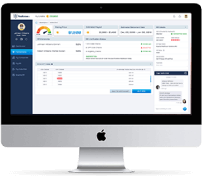
How can we help?
Fill out the short form below or call us at (888) 846-5382
Looking for software solutions to build your product?
Let's discuss your software solutions for your product in our free development acceleration call!
Get In Touch arrow_forwardDiscuss Your Project Handover with a team of expert Book a free consultation arrow_forward
About Author
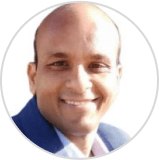
Written by Riken Shah linkedin
Riken's work motto is to help healthcare providers use technological advancements to make healthcare easily accessible to all stakeholders, from providers to patients. Under his leadership and guidance, OSP Labs has successfully developed over 600 customized software solutions for 200+ healthcare clients across continents.







